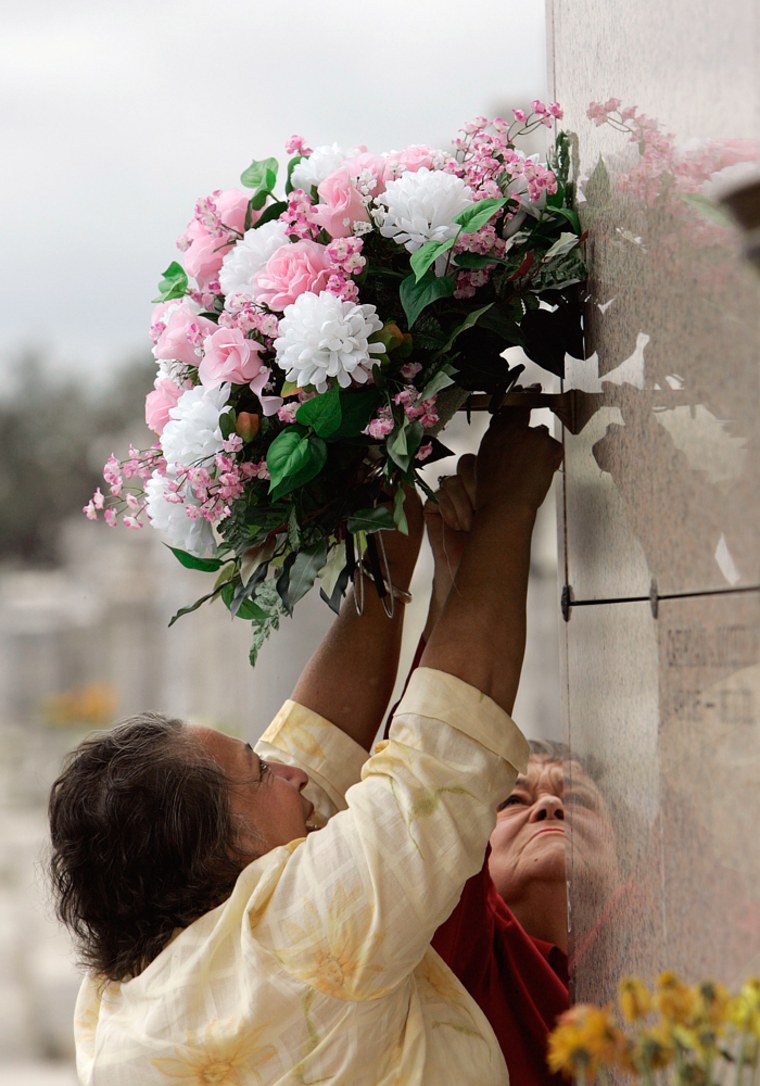NEW ORLEANS — All Saints' Day, the Christian holiday to honor the dead, has traditionally been marked with great fanfare in this predominantly Catholic city. Typically, families pay their respects to departed loved ones and spruce up many of the city's elaborate above-ground graves.
This year, of course, things were much different.
At 9 a.m. Tuesday, instead of the usual line of traffic and cars parked on every avenue leading to Greenwood Cemetery, one of the famed “Cities of the Dead,” only a solitary car was pulled up to its front gates. Adding to the gloom, a light rain had revived the pungent presence of mold and rotting debris.
Fewer people, but still flowers
Janice Barry, 56, whose family has lived in New Orleans since the early 1800’s, carried flowers to put on the three vaults she has visited on this day of remembrance for as long as she can remember.
She is usually accompanied by other family members, but on this All Saints' Day she was making the pilgrimage on her own. As she placed a few stems in a vase-shaped granite mold, she said a silent prayer and crossed herself before walking to the next family monument.
“There are so few people,” she said, before explaining how much the monuments, with their multiple engravings, mean to her as well as the many of the families that were absent this year.
"You don’t think in terms of the individual, you think in terms of family," she said. "So we continue through death as a family.”
Glenn and Marilyn McCall, a middle-aged couple from New Orleans' West Bank district, walked hand in hand through the empty cemetery to lay flowers and remember their dead.
Marilyn McCall paused and looked around. “There doesn’t seem to be as much devastation in the cemetery as other places,” she said as she began to cry.
“There’s nothing untouched,” she added, her eyes still filled with tears. “Nobody’s untouched in this area. Everybody has suffered in some way.”
“There’s hardly anybody out here compared to what there normally is,” said her husband, who was holding flowers. “Everyday things are coming back. Life is resuming. It’s just going to take a lot of time.”
Cleaning up
Melvin Felder was out of breath as he filled a bucket from a nearby spigot, one of many placed in the cemetery so families can water plants and cut flowers, before working tirelessly with a scrubbing brush and liquid clearner to remove the deep film of dirt covering a relative's tombstone.
“Somebody’s got to do it,” he said, becoming emotional as he took a break to get more water. “You got to show some respect, you know.”
Climbing back to the top of the tomb, Felder resumed scrubbing as his wife, Gloria, watched, holding the flowers she would place next to the tomb when he finished.
“I’ll have it back snow-white again,” said Felder, nodding at the spot he had already cleaned.
Eventually, a few more families arrived, flowers in hand. They appeared to be walking with determination, but managed smiles for others they encountered. Their smiles may have returned, but the seriousness of this particular All Saints' Day was pervasive.
Ancestors would notice if no one visited
Katherine Smith and Cyndy Huber, two sisters from suburban Metairie, approached Felder and his wife pushing a stoller. Huber’s toddler grandson, Brice Andrew Pitts, was making his first pilgrimage to the resting places of his ancestors. The sisters had big smiles for everyone they greeted and stopped for a chat.
“The day couldn’t go by without us coming and bringing flowers,” Huber explained.
“They used to sit on benches and have picnics,” her sister added, laughing as she thought of happier times.
In recent years shuttle buses would carry crowds of family members through the labyrinth of avenues in the huge cemetery — where street signs with names like Metairie and Jessamine are posted at intersections through the 150 acres of imposing tombs. On Tuesday, there was no need for buses.
“If we were still evacuated,” Huber reflected, “it may have come and gone without flowers.… We would have felt like, 'Oh well, we’ll have to catch it next year.'”
“I think we would have heard secret voices,” said her sister, injecting the voices, “’You girls didn’t get out there.’”
They both laughed, perhaps remembering the ancestors who would bring that message.
Their laughter attracted the attention of the Felders, and before long the four were chatting and laughing.
For a few moments, the spirit of previous All Saints' Days was alive.
